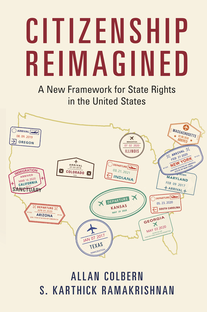|
|
I am an assistant professor in the School of Social and Behavioral Sciences at Arizona State University. My scholarship explores how the relationship between political institutions and social movements shape developments in the rights of racial minorities and immigrants at the national, state and local levels. I spend a lot of time engaging in advocacy connected to my academic work, which includes working closely with immigrant rights organizations in states like California and New York to help them build state-wide movement capacity and design long-term policy blueprints.
Research Interests: American Political Development Citizenship (in theory, law, and practice) Race, Ethnicity, and Politics Immigration Constitutional Law Federalism Public Policy Social Movements (with a focus on: African American rights; Immigrant rights) Research Methods |

My first book, "Citizenship Reimagined: A New Framework for State Rights in the United States," was published last year with Cambridge University Press (2020). The notion of citizenship as the monopoly of national governments, and deriving exclusively from legal status, does not match the reality of how citizenship rights operate today. My co-author and I show that “state citizenship” in the United States makes sense in a federalist framework, operating as a parallel concept to national citizenship. It does not refer to state secession by another name, nor is it meant to highlight states’ rights as in the context of the American Civil War. We argue that federalism has lasting consequences for citizenship, which we define quite simply as the provision of rights by a political jurisdiction to its members. Through our rights-based multi-dimensional and federated conceptual framework, Citizenship Reimagined traces and explains three types of state citizenship that have developed throughout American history: regressive state citizenship, where states erode rights that granted to individuals at the federal level; reinforcing state citizenship, where states enforce federal limitations on rights to particular types of individuals; and progressive state citizenship, where states exceed the rights granted to particular types of individuals at the federal level. Citizenship Reimagined can be purchased on Amazon (link), Google Books (link) or at Cambridge University Press (link). For access to the book's datasets and additional policy toolkits, please visit our book's webpage: https://citizenshipreimagined.org
I received Russell Sage Foundation’s Presidential Award for their Race, Ethnicity, and Immigration initiative 2018-2021 to support the completion and publication of my second book, "Today’s Runaway Slaves: Unauthorized Immigrants in a Federalist Framework." The book project explores how federated political institutions (constitutions, courts, parties) and social movements create resistance against unjust federal laws that racialize and dehumanize racial minorities and immigrants as "illegal." Sanctuary is more than about resisting federal law. I argue that sanctuary laws transform(ed) and protect(ed) Black and immigrant rights at the state and local levels, when federal rights and protections were non-existent. I show this by unpacking three periods where sanctuary policies developed in response to harsh federal enforcement regimes and exclusionary laws: runaway slaves (1780-1860), Central American asylum seekers (1980-1996) and undocumented immigrants (1997-2020). The parallels drawn between these periods are featured in my TEDxASUWest Talk, We Have Been Here Before (September 2020):
I received Russell Sage Foundation’s Presidential Award for their Race, Ethnicity, and Immigration initiative 2018-2021 to support the completion and publication of my second book, "Today’s Runaway Slaves: Unauthorized Immigrants in a Federalist Framework." The book project explores how federated political institutions (constitutions, courts, parties) and social movements create resistance against unjust federal laws that racialize and dehumanize racial minorities and immigrants as "illegal." Sanctuary is more than about resisting federal law. I argue that sanctuary laws transform(ed) and protect(ed) Black and immigrant rights at the state and local levels, when federal rights and protections were non-existent. I show this by unpacking three periods where sanctuary policies developed in response to harsh federal enforcement regimes and exclusionary laws: runaway slaves (1780-1860), Central American asylum seekers (1980-1996) and undocumented immigrants (1997-2020). The parallels drawn between these periods are featured in my TEDxASUWest Talk, We Have Been Here Before (September 2020):
I recently published a chapter on immigration policy in Immigrant California: Understanding the Past, Present, and Future of U.S. Policy (Stanford University Press, 2021) and my work has been featured in popular sources like the Washington Post and Los Angeles Times.
In my spare time, I enjoy trail distance running. I've completed the San Diego 100 Mile Endurance Run, the Old Goat 50 Miler and the San Diego 50 Miler, and have hopes to do another 100 miler. I have two beautiful kids (Maya is 4 years old; Kilian is 9 months old) and an incredibly supportive wife, Shima.

